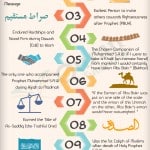Biographies Archive
23 Apr 2015
Hazrat Salman Farsi (R.A) – Seeker Of The Truth

Hazrat Salman (R.A) was born in the city of Kazrun approximately in 568 A.D and was raised in a small village Jiyye or Jayyan of the city of Isfahan. His familial name was Rozeba or Ruzbeh which is a Persian name. After accepting the Religion of Peace, his name was changed to Salman by the
21 Apr 2015
Hazrat Khalid Bin Waleed (R.A) – The Sword Of Allah

Hazrat Khalid bin Waleed (R.A) was born in a highly respected family of Banu Makhzum of the tribe of Qureysh in Makkah in nearly 585 A.D. His folks were one of the three primary people of its clan and were also in charge of the matters relating to battles. That is why he (R.A) grew
10 Apr 2015
Hazrat Bilal Habshi (R.A) – The First Muezzin In Islam

Hazrat Bilal (R.A) was a black African primarily belonging to the Western Arabia. He was born in Abyssinia, also known as Ethiopia in the 6th Century A.D. His father, Rabah was an Arab and his mother, Hamama was basically an Abyssinian. Both of his parents were in custody of a rich Qureyshi person in Makkah
03 Apr 2015
A Short Biography of Hazrat Usman Ibn Affan (R.A) – Al-Ghani

Hazrat Usman (R.A) was born to a noble family of “Ummayah” belonging to the Makkan tribe of Qureysh, in 573 A.D. The Umawwins had great distinction in Pre Islamic era as in the battle of Fajr, the commander in chief of the entire clan`s army belonged to these people. His ancestral history also matched with
03 Apr 2015
Biography Of Hazrat Abu Bakr (R.A) – As-Siddeeq

Hazrat Abu Bakr (R.A) was born in a highly respected family of Banu Tamim of the tribe of Qureysh in Makkah in 573 A.D. His name by birth was Abdullah and Abu Bakr was the inherited one. His father was Uthman, commonly known as Abu Quhafa and his mother was Salma, whose patronymic identity was
26 Mar 2015
Hazrat ALI (R.A) – The Lion of Allah

Hazrat Ali (R.A) was born in nearly 600 A.D, some 30 years after the birth of the Messenger ﷺ of God, to a well known family of Qureyshi tribe, Bani Hashim, in Makkah. His father, named Abu Talib, was a custodian of the Holy Kaaba and his mother was Fatima, both of whom were Hashimites.
13 Mar 2015
Biography of Hazrat Umar Bin Khattab (R.A) – Al-Farooq

Born in around 580 A.D, Hazrat Umar (R.A) belonged to Adi tribe of Qureysh in Makkah. He was about 10 years younger than the Holy Prophet ﷺ, and both also shared the same ancestors. His forefathers played a great role in settling disputes among the clans, the Adi family used to lead them as an






